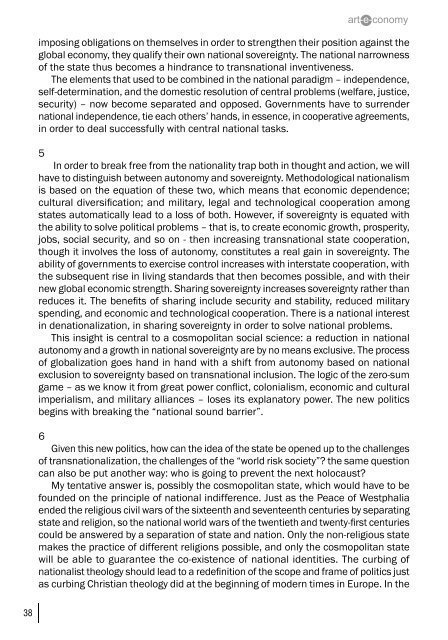art-e-conomy _ reader - marko stamenkovic
art-e-conomy _ reader - marko stamenkovic
art-e-conomy _ reader - marko stamenkovic
Create successful ePaper yourself
Turn your PDF publications into a flip-book with our unique Google optimized e-Paper software.
38<br />
imposing obligations on themselves in order to strengthen their position against the<br />
global e<strong>conomy</strong>, they qualify their own national sovereignty. The national narrowness<br />
of the state thus becomes a hindrance to transnational inventiveness.<br />
The elements that used to be combined in the national paradigm – independence,<br />
self-determination, and the domestic resolution of central problems (welfare, justice,<br />
security) – now become separated and opposed. Governments have to surrender<br />
national independence, tie each others’ hands, in essence, in cooperative agreements,<br />
in order to deal successfully with central national tasks.<br />
5<br />
In order to break free from the nationality trap both in thought and action, we will<br />
have to distinguish between autonomy and sovereignty. Methodological nationalism<br />
is based on the equation of these two, which means that economic dependence;<br />
cultural diversification; and military, legal and technological cooperation among<br />
states automatically lead to a loss of both. However, if sovereignty is equated with<br />
the ability to solve political problems – that is, to create economic growth, prosperity,<br />
jobs, social security, and so on - then increasing transnational state cooperation,<br />
though it involves the loss of autonomy, constitutes a real gain in sovereignty. The<br />
ability of governments to exercise control increases with interstate cooperation, with<br />
the subsequent rise in living standards that then becomes possible, and with their<br />
new global economic strength. Sharing sovereignty increases sovereignty rather than<br />
reduces it. The benefits of sharing include security and stability, reduced military<br />
spending, and economic and technological cooperation. There is a national interest<br />
in denationalization, in sharing sovereignty in order to solve national problems.<br />
This insight is central to a cosmopolitan social science: a reduction in national<br />
autonomy and a growth in national sovereignty are by no means exclusive. The process<br />
of globalization goes hand in hand with a shift from autonomy based on national<br />
exclusion to sovereignty based on transnational inclusion. The logic of the zero-sum<br />
game – as we know it from great power conflict, colonialism, economic and cultural<br />
imperialism, and military alliances – loses its explanatory power. The new politics<br />
begins with breaking the “national sound barrier”.<br />
6<br />
Given this new politics, how can the idea of the state be opened up to the challenges<br />
of transnationalization, the challenges of the “world risk society”? the same question<br />
can also be put another way: who is going to prevent the next holocaust?<br />
My tentative answer is, possibly the cosmopolitan state, which would have to be<br />
founded on the principle of national indifference. Just as the Peace of Westphalia<br />
ended the religious civil wars of the sixteenth and seventeenth centuries by separating<br />
state and religion, so the national world wars of the twentieth and twenty-first centuries<br />
could be answered by a separation of state and nation. Only the non-religious state<br />
makes the practice of different religions possible, and only the cosmopolitan state<br />
will be able to guarantee the co-existence of national identities. The curbing of<br />
nationalist theology should lead to a redefinition of the scope and frame of politics just<br />
as curbing Christian theology did at the beginning of modern times in Europe. In the


